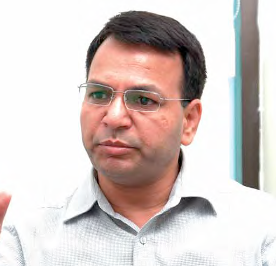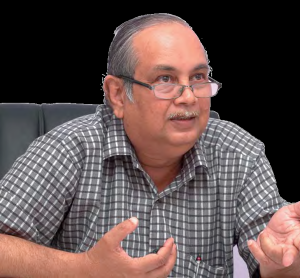 Specialised in Critical Care, Dr Rajib Paul,
Specialised in Critical Care, Dr Rajib Paul,
Senior Intensivist at Apollo Hospital; Hyderabad thinks that Critical Care is the backbone of medical and surgical treatment. Whilst in an interaction with Shreya Mukherjee he talks about other challenges and future prospects of technology in Critical Care
What are the challenges that the hospitals face in delivering Critical Care treatment in India?
The most important challenge is the shortage of staffs. There are not too many experienced or trained critical care specialists in India. The courses have started very recently that is only for last five years in India. There are very few recognised courses in India. Now-a-days every big hospital has ICUs and especially multi-specialty hospitals. In some hospitals, 25 percent of the beds are ICU beds that mean a huge number of intensive care doctors are required. Thus, man power is a major problem. Good trained nurses for CCUs are not there. General Nurses cannot work in CCUs Infrastructure is based on the money part of it.

What are the latest technologies and devices that are being used in CCUs?
Almost all CCUs whether small or big will have some basic instruments like bed side monitors, which monitors patients heart rates blood pressure, oxygen saturation in the valves plus some other monitors to monitors of special pressures what we call Invasive pressures for both blood and heart. Along with that, mostly good ICUs will have ventilators and dedicated dialysis machines, ultra sound machines,dedicated X-ray machines. Advanced ventilators are also available in most of the tertiary care ICUs.
My personal opinion is technology is always subservient to human mind. Critical Care instruments help you in better management but ultimately the decision has to be taken by the intensivist
According to you, what is the present and future scenario of Critical Care?
First of all Critical Care is an evolving branch. It is an amalgamation of multiple branches in a sense that one doctor may have to do a work of cardiologist at one time and work of a nephrologists at other, even same time like a physicians. So, the doctors may have to do multi-focal roles because the patient is in ICU and the doctor cannot call other doctors every time to diagnose the patient. Future of critical care what I see is the nodal point of hospitals. Most hospitals of these days are building in two things. That is preventive healthcare Which is not only for good quality but also for volume and number generation for us. More preventive health checks ultimately leads to a broader base for hospitals. At the same time hospital with a backbone of a very good and strong CCU gets trust of the patients around the corner. It increases the reliability quotient among the patients.

What is the sphere of interest or inclination of going to be doctors? Do they have inclination towards CCU?
Whole concept of Critical Care is developed around metro cities and urban cities. In that sense Critical Care is a comprehensive approach. Making a room with ventilators and monitors is not critical care that is only called Intensive Care Monitoring bed. Critical Care Unit requires trained intensivists along with junior intensivist, trained critical care nurses, physiotherapists, respiratory therapists, IT professionals who looks after Critical Care patients particularly. Then it requires in-house pharmacists to take care. So, in such scenario we want more trained doctors to come up. The new generation is not taking up critical care because it is a very labour intensive work. You have to have a very challenging mind. You have to be with the patient continuously both mentally and physically. It is a very dynamic field. The patient who is stable in the morning can start sinking at night. If someone is at home in night the doctor should have the full grasp of the patient when he gets call from doctors at night. You have to have a strong love for the field in order to sustain. Second is the burn-out factor which is pretty high. A recent study shows that burn-out factors among intensivists are the highest because of continuous physical and mental fatigue. Doctors burn-out within 5-10 years of medical care. They start moving out as private practitioners. At present the remuneration in India are not so good. All these factors together draw back people from critical care approach. Only anesthetists are the ones who prefer to go to the critical care department mainly because usually they work in OT from there they shift to CCU. However, if remuneration increases in India over coming years then some doctors would take up critical care and will find a job or career out of it.
What are your plans to expand CCU in tier II and tier III cities?
Critical Care medicines are doing very good in India. In small cities they are forming Critical Care Societies in small towns. All top in cities in India have CCU. They have regular meetings, presentations and interactions with city doctors. If you take example of Andhra Pradesh, at first only Hyderabad had CCU but now Vizag, Vijayawada have also started forming Critical Care Societies which ultimately is governed by the central society but they also have unit societies or city societies. All these societies are making Critical Care more comprehensive. People come to know about it, more interactions happen and slowly critical care evolves in those areas.
How do you think technology helps in delivering Critical Care to patients?
them. We all look for new gadgets and instruments and every day new technology and instruments are coming but the person who is taking charge of those gadgets are far more important than the gadgets and instruments. The hospitals should give more importance to the intensivists and second importance to the gadgets.
What CCU facilities are available in your hospital?
We have Intensive Care Monitoring. Presently our system works on structured units. We have different medical care units like surgical Intensive Care Unit, Cardiac Intensive Care Unit, cardio- classic Intensive Care Unit, Pediatric Intensive Care Unit and Urinary Intensive Care Unit. All different specialties have their own Critical Care Unit and each is manned by a Critical Care specialist. This is the structure which we are running at present in future we may start developing units with different types of patients in one unit.
Be a part of Elets Collaborative Initiatives. Join Us for Upcoming Events and explore business opportunities. Like us on Facebook , connect with us on LinkedIn and follow us on Twitter , Instagram.




